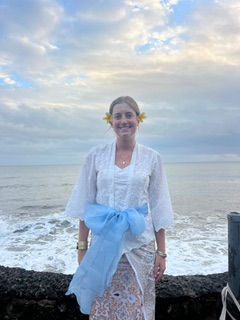Emma Jackson's Graduate School Practicum on the Rohingya Refugee Crisis
- Global Health Program

- Nov 24, 2021
- 4 min read
Emma Jackson spent part of her summer in 2020 working with an implementing and funding organization in the Rohingya Refugee Crisis in Cox's Bazar, Bangladesh to help standardize aspects of the maternal and perinatal death surveillance, and review the system (MPDSR) in place to collect data on mortality, to determine cause of maternal/perinatal death, and to review cause of death data to formulate a response.
To her, it was a sobering learning experience that has created many questions in her mind. Outside of the technical learning about death surveillance, monitoring, and evaluation, Emma learned about how humanitarian health systems function and about the unfortunate politics of humanitarian aid and the Rohingya refugee crisis. She learned about the role midwifery plays in saving the lives of mothers and babies, and developed an interest in potentially pursuing training in that one day. She also learned very quickly that to get anything done in that setting, you had to be very assertive.
I have been thinking a lot about trauma and data collection... in particular how to ensure that in situations like this, the data collection/surveillance being done is trauma-informed and data collectors are sufficiently and consistently trained.
The Rohingya have experienced generations of trauma and persecution. They cannot go back to Myanmar realistically, and the government of Bangladesh will not allow them to live outside of the camps, nor to access education. They are stuck in limbo, in an extremely population-dense living environment that sits in a geographical area at high risk for monsoon flooding and typhoons. Drug and human trafficking has increased in the area since the influx of Rohingya fleeing persecution. While humanitarian aid workers have set up a health system, bolstered infrastructure, and are still there working to make sure the health needs of these people are met, it is a dire situation.
Since doing this practicum, Emma has been thinking a lot about the ethics of mortality data collection/surveillance when there is no standardized system for reviewing the data and taking action to address cause of death. This is what the humanitarian organization was working towards, but as it stands, the first maternal death review meeting was held while Emma was there during the summer of 2020. Prior to that, one person at UNFPA was reviewing all the verbal autopsies. In this field, everyone is very focused on action in the moment - logistics, disease surveillance, funding, referral, ambulances, etc. Emma understood that all of these factors makes it very difficult to get people to pause and think about what to do with all the data that comes in.
Burnout is a really big issue with humanitarian aid workers- and I can see why. It is heavy work.
While Emma did create an M&E framework that she talked through with implementing and funding organization staff, she quickly became aware that most of the systems that would need to be in place to monitor maternal/neonatal death surveillance were not set up and/or functioning properly, and shifted to working with the implementing organization to establish protocols for mortality data collection and entry. She ended up creating several data tracking tools for the Community Health Worker supervisors and for the MIS staff at the implementing organization to help people stick to the protocol, and did two trainings with the 32 CHW supervisors - one on data quality and the other on the new tracking tools I created.
Thinking in so much depth about an ideal maternal/neonatal death surveillance and review system (my M&E framework) and then getting to witness and investigate how the current surveillance was functioning was such a humbling learning experience. I understand now why these situations are called "complex humanitarian emergencies". They are utterly complex. I am actually astonished at what has been set up in terms of a health sector and surveillance system in the span of about a year...and at the core of it, a million human beings.
Emma investigated to better understand what was and wasn't functioning: She interviewed doctors at the implementing organization's health post, at other health posts in the camps, and at the local government referral hospital to see how mortality reporting was functioning at each; She spoke with the WHO about their central data-base and the issues that the implementing organization was having in reporting to it; She attended the community health worker working group meetings to better understand the coverage of CHWs across camps and to better understand data coverage; She worked with the funding organization to organize the first maternal/neonatal death review committee meeting and attended it; finally, she shared her concerns about data quality with the head of the UNHCR CHW working group.
Emma also designed protocols for data collection and data entry, created and delivered training on data quality and reporting, and created a filing system for the mortality reports at the organization. She worked closely with each staff member involved to set up the data system.
I got to work with an extremely talented, hardworking group of people at the implementing organization. Aside from being wonderful colleagues, they were wonderful friends to me and the other student working there. We learned from them and laughed with them. A contingent of our friends accompanied us to the airport to say goodbye. I cried as we flew away, hurting to say goodbye to good people.












Comments